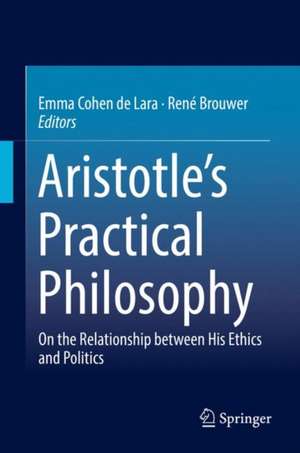Aristotle’s Practical Philosophy: On the Relationship between His Ethics and Politics
Editat de Emma Cohen de Lara, René Brouweren Limba Engleză Hardback – 18 ian 2018
| Toate formatele și edițiile | Preț | Express |
|---|---|---|
| Paperback (1) | 579.34 lei 6-8 săpt. | |
| Springer International Publishing – 4 iun 2019 | 579.34 lei 6-8 săpt. | |
| Hardback (1) | 728.28 lei 6-8 săpt. | |
| Springer International Publishing – 18 ian 2018 | 728.28 lei 6-8 săpt. |
Preț: 728.28 lei
Preț vechi: 888.14 lei
-18% Nou
Puncte Express: 1092
Preț estimativ în valută:
139.36€ • 146.17$ • 116.01£
139.36€ • 146.17$ • 116.01£
Carte tipărită la comandă
Livrare economică 01-15 aprilie
Preluare comenzi: 021 569.72.76
Specificații
ISBN-13: 9783319648248
ISBN-10: 3319648241
Pagini: 189
Ilustrații: VI, 194 p.
Dimensiuni: 155 x 235 mm
Greutate: 0.46 kg
Ediția:1st ed. 2017
Editura: Springer International Publishing
Colecția Springer
Locul publicării:Cham, Switzerland
ISBN-10: 3319648241
Pagini: 189
Ilustrații: VI, 194 p.
Dimensiuni: 155 x 235 mm
Greutate: 0.46 kg
Ediția:1st ed. 2017
Editura: Springer International Publishing
Colecția Springer
Locul publicării:Cham, Switzerland
Cuprins
Introduction; Emma Cohen de Lara and René Brouwer.- Chapter 1: Aristotle’s Politics: Ethical Politics or Political Realism?; Emma Cohen de Lara.- Chapter 2: Aristotle’s Politikos: Statesmanship, Magnanimity, and the Rule of the Many; Patrick Overeem.- Chapter 3: Justice in Aristotle’s Ethics and Politics; René Brouwer.- Chapter 4: A Distinction with A Difference: Aristotle’s Division of Particular Justice and its Practical Significance; Andrei Poama.- Chapter 5: Is Human Virtue Citizen-Virtue? Reading Aristotle’s Politics 3.4; L. K. Gustin Law.- Chapter 6: Between Friendship and Self-sufficiency. The Possibility of Human Flourishing in the Relationship between Aristotle’s Ethics and Politics: A Multifocal Approach;
Arianna Fermani.- Chapter 7: Perfect Friendship in the Political Realm: A Philosophical Trait-d’Union between the Nicomachean Ethics and Politics; Elena Irrera.- Chapter 8: How Political are Virtue and Happiness?; Micah Lott.- Chapter 9: A Political Interpretation of Aristotle’s Ethics; Brian J. Collins.- Authors’ bios.- General index.- Index locorum.
Notă biografică
Emma Cohen de Lara (PhD University of Notre Dame) is research fellow at the Amsterdam Institute for Social Science Research and senior lecturer in political theory at Amsterdam University College. Her current research focuses on Aristotle’s political realism. Her publications include: ‘Aristotle’s Rhetoric and the Persistence of the Emotions in the Courtroom’ in: Huppes-Cluysenaer, L. and N. Coelho, (eds.), Aristotle Law and Emotion (Springer, forthcoming) and ‘The Affective Dimension of Citizenship: A Platonic Account’ in: Thunder, D. (ed.), The Ethics of Citizenship in the 21st Century (Springer, forthcoming). She has also edited a volume on liberal education Back to the Core: Rethinking Core Texts in Liberal Arts and Science Education in Europe (Vernon Press, forthcoming).
René Brouwer (PhD Cambridge, MPhil Utrecht, LLM Amsterdam) teaches philosophy and law at the University of Utrecht. He has worked in thephilosophy and history of law as well as in ancient philosophy, with focus on Stoicism, including its origins and reception, and the tradition of natural law. Recent publications include: The Stoic Sage (CUP, 2014), ‘Stoic Sympathy’ in: Schliesser, E. (ed.), Sympathy (Oxford Philosophical Concepts), New York 2015, pp. 15-35, ‘Ulpian’s Appeal to Nature: Roman Law as Universal Law’, Legal History Review 83 (2015), pp. 60-76. His current research is on the interaction between law and philosophy in the late Roman republic as well as on conceptions of justice in antiquity.
Textul de pe ultima copertă
This book is the first collection of essays in English devoted solely to the relationship between Aristotle’s ethics and politics. Are ethics and politics two separate spheres of action or are they unified? Those who support the unity-thesis emphasize the centrality for Aristotle of questions about the good life and the common good as the purpose of politics. Those who defend the separation-thesis stress Aristotle’s sense of realism in understanding the need for political solutions to human shortcomings. But is this all there is to it? The contributors to this volume explore and develop different arguments and interpretative frameworks that help to make sense of the relationship between Aristotle’s Ethics and Politics. The chapters loosely follow the order of the Nicomachean Ethics in examining topics such as political science, statesmanship and magnanimity, justice, practical wisdom, friendship, and the relationship between the active and the contemplative life. They have in common an appreciation of the relevance of Aristotle’s writings, which offer the modern reader distinct philosophical perspectives on the relationship between ethics and politics.
Caracteristici
First edited volume to systematically reflect on the relationship between Aristotle’s Ethics and Politics Critically reflects on the coherence of Aristotle’s thinking about ethics and politics Argues that renewed reflection is necessary in order to provide a more thorough understanding of how ethics relates to politics for Aristotle
